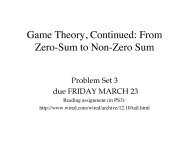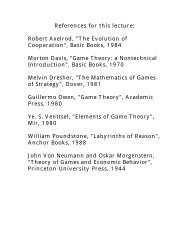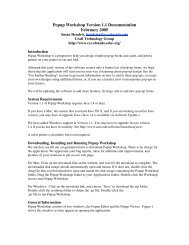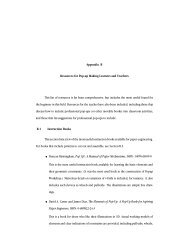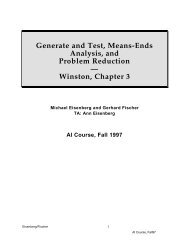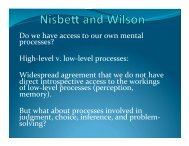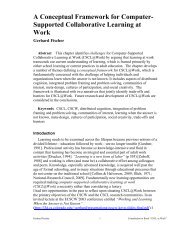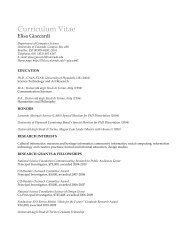CSCI 1240: The Computational World Problem Set 1: Week 1 ...
CSCI 1240: The Computational World Problem Set 1: Week 1 ...
CSCI 1240: The Computational World Problem Set 1: Week 1 ...
Create successful ePaper yourself
Turn your PDF publications into a flip-book with our unique Google optimized e-Paper software.
<strong>CSCI</strong> <strong>1240</strong>: <strong>The</strong> <strong>Computational</strong> <strong>World</strong><br />
<strong>Problem</strong> <strong>Set</strong> 1: <strong>Week</strong> 1<br />
<strong>Problem</strong> 1. (5 points) Write a brief (~300 words) response to the Turing paper selecting<br />
one of the objections mentioned in the paper and explaining why you think that objection<br />
either is or is not particularly provocative.<br />
<strong>Problem</strong> 2. (5 points) Write a brief (~300 words) response to John Searle's "Chinese<br />
Room" thought experiment, selecting one of the objections mentioned in Searle's paper<br />
and explaining why you think the objection, or Searle's response, is particularly effective.<br />
<strong>Problem</strong> 3. (4 points) Find an implementation of Weizenbaum's "Doctor" program on<br />
the Web (you might also find it under the name of "Eliza"), and act the role of the patient<br />
for at least a dozen or so exchanges. Analyze the program's responses along the following<br />
lines: would you be led to believe that the program actually knows anything about<br />
psychiatry? About you and your problems in particular? Point to a particular response<br />
and discuss how that response could be made by a program that knows some syntactic<br />
rules (such as changing first-person sentences to second-person sentences) without<br />
actually knowing any semantics (meaning) about the topic under discussion. Do you<br />
think the Doctor program might have any therapeutic value (for instance, if you were<br />
actually feeling troubled about something, would you derive any comfort from a<br />
"conversation" with the program)?<br />
<strong>Problem</strong> 4. (3 points) In lecture, we discussed the difficulty that computers have in<br />
understanding simple stories, and we suggested that part of that difficulty is because it is<br />
hard to program in "common sense knowledge". Recently, there have been impressive<br />
attempts to use the vast knowledge base of the Web as a source of all sorts of factual<br />
information (including, perhaps, some "common sense" knowledge)–a source that<br />
computers can automatically search. Take a look at IBM's hot-off-the-press "Watson"<br />
Jeopardy-playing system, as described in the New York Times:<br />
http://www.nytimes.com/2010/06/20/magazine/20Computer-t.html?hp<br />
Try playing "Jeopardy!" against Watson, and see how you do (I beat the program, but just<br />
barely):<br />
http://www.nytimes.com/interactive/2010/06/16/magazine/watson-trivia-game.html?hp<br />
On what sorts of questions did you do better than the computer? On what sorts did you do<br />
worse? Discuss your impressions of the sort of "knowledge" that Watson appears to have.<br />
<strong>Problem</strong> 5. (8 points) For each of the following sets, identify whether the size (or to be<br />
technical, "cardinality") of the set is finite, infinite-and-countable, or infinite-anduncountable.<br />
Explain your answer in each case. For extra credit: if the set is finite, write<br />
an expression that gives the number of items in the set.
a. <strong>The</strong> set of all rational numbers between 0 and 0.001<br />
b. <strong>The</strong> set of all irrational numbers between 0 and 0.001<br />
c. <strong>The</strong> set of all distinct ways of ordering a deck of 52 cards.<br />
d. <strong>The</strong> set of all possible ways of assigning either 0 or 1 to 40 distinct slots. (Another way<br />
of thinking of this: imagine 40 blanks. How many distinct binary numbers can you write<br />
in those 40 blanks?)<br />
e. <strong>The</strong> set of all possible ways of assigning either 0 or 1 to a countably infinite number of<br />
slots. (Another way of thinking about this: how many possible infinite-length binary<br />
numbers can you write?)<br />
f. <strong>The</strong> set of all perfect squares (1, 4, 9, 16…).<br />
g. <strong>The</strong> set of all distinct pairs from an overall set of 100 items. (Another way of thinking<br />
of this: there are 100 people in a room. How many distinct handshakes are possible?)<br />
h. <strong>The</strong> set of all points in the interior of a unit circle (the circle of radius 1).<br />
i. <strong>The</strong> set of all possible (syntactically correct) Turing machine programs that can be<br />
written in at most 500 standard alphabetic characters.<br />
j. <strong>The</strong> set of all possible programs for a Turing machine.



